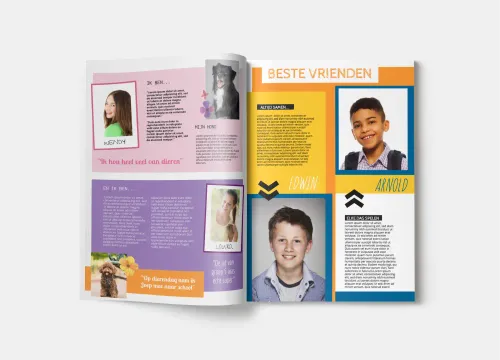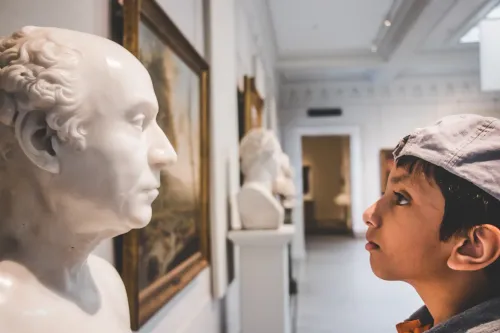A school newspaper is a great project and a good opportunity for all students to learn something new. This includes getting to know different types of texts and trying them out right away. Many questions come up: How do I write a report? What is a news story? How do I conduct an interview? We have compiled a small list of text types in the school newspaper. This will help you to find your way around.
Different types of writing
When you have an idea of what you want to write about, you first research all the facts. From the collected information you then formulate your article. There are different types of texts you can choose from. Which one you choose depends on what you want to achieve with your text and how much material you have. We present you the 10 most important text types:
1: News item
The message informs briefly and crisply about the most important facts of an event. In it, you really only answer the four W-questions and H-question: Who? What? When? Where? How? Why? A message is formulated neutrally. This means that you do not say in the message what you yourself think of the event. An example from everyday school life: your school's volleyball team participated in the city championships last weekend and came in second. This is exactly the information that the short message about it would contain.
2: Interview
In an interview, you reproduce a conversation that you have had with a person on a particular topic. What this person has to say is interesting because, for example, he or she is the cause or the victim of a problem. Imagine that the principal of your school decides to cut the big break by five minutes. Then it's exciting to find out why he's doing this. But then you also want to know what the people affected - in this case students and teachers - think about it. You can therefore conduct an interview with both parties to present their respective points of view. Often a third person is also interesting: the expert. He or she can explain backgrounds and contexts to you in an interview. Example: The bus schedule has changed. The buses with the students now arrive at the school five minutes later in the morning, so the first lesson can only start five minutes later. An employee of the bus company can explain to you in an interview why the bus schedule has been changed. Preparation is important for a good interview. Think about the topics you want to learn more about. You can already think of a few questions to ask. Be careful, though: Your interviewer probably won't have an answer to all your questions. Be prepared to ask follow-up questions during the interview to find out exactly what your interviewer means. Sometimes the interviewer will answer questions that you haven't asked yet. Of course, you should not ask these again later. It's best to record the interview with your smartphone. Then you don't have to take notes and can concentrate fully on your interviewer. However, be sure to ask him or her for permission to record the interview in advance. You can transcribe (write down) the recorded interview later. If necessary, you can summarize or shorten the individual answers so that they are easier to read and understand. Make sure, however, that you do not change the meaning of the statement. It is best to show the transcribed version of the interview to your interviewee and get his or her permission before publishing it.
3: A reportage
In a report, the writer tells about an event that he or she has experienced or a topic that concerns him or her. You can tell how you experienced an event, what you think about it, and what others think about it. Or you can accompany an interesting person for a day and then write a report about what that person does, thinks and feels. The goal of a report is to give the reader the feeling of being there. You can achieve this by describing the situation in detail. Ask yourself questions such as: What did you experience? Who did what? What was the role of those involved? How did you feel about it? What was the atmosphere like?
What do other people involved report? - To be able to answer all these questions, a report is usually long and detailed. It often takes up several pages in a magazine and contains many photos. A report usually takes a look behind the scenes. For your school newspaper, for example, you can write a report on important school events, such as the school concert or the graduation ball, for which you accompany the participants for a day.
4: Comment
If a topic moves you and you want to make your own opinion clear, write a comment. It is important that you support your personal opinion with facts and arguments. That means that you prove why you hold this opinion. Let's take the example of shortening the break by five minutes again. If you write in your comment that you think the director's decision is stupid because you'll have less time to play, that's not very convincing. However, if a study has shown that students learn better when they have longer breaks, you can justify your opinion well. You can write a comment on anything that moves you. Mostly, however, you write it when something pisses you off. By the way: If you regularly publish a commentary in the school newspaper on a variety of topics, it is called a column. You are then a columnist.
5: Preview
In a preview, you present, for example, which movies will be released this year or which books will be published. Even if you make an overview of all important school dates at the beginning of the school year, that is a preview. When you write a preview, it is especially important that you keep it short and to the point. This will arouse your readers' curiosity so that they can hardly wait for the book, the film or the next issue of your school newspaper.
6: Review
When the eagerly awaited movie or the new book in your favorite series is finally released, write a review. In it, you explain whether you would recommend the book or movie to your readers. Also explain why you think it's good or not good at all.



